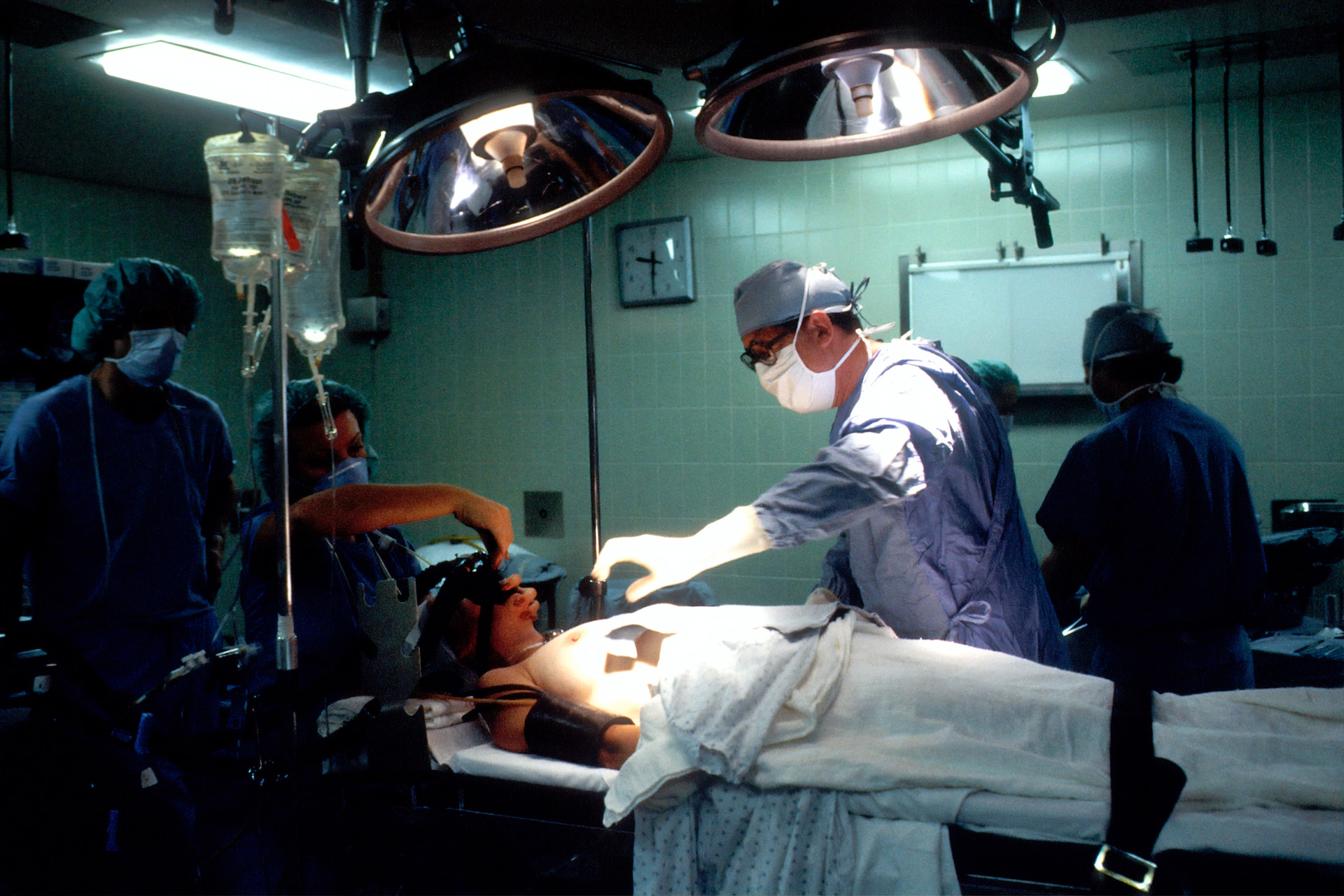Thoracic Surgery - A Guide To Procedures, Risks, And Recovery
Thoracic surgery is a specialized field of surgery that focuses on the organs and tissues within the chest cavity, including the lungs, heart, esophagus, trachea, and other structures.
Author:Suleman ShahReviewer:Han JuMar 31, 202312K Shares574.6K Views

Thoracic surgeryis a specialized field of surgery that focuses on the organs and tissues within the chest cavity, including the lungs, heart, esophagus, trachea, and other structures.
Thoracic surgeons are highly skilled professionals who are trained to diagnose, treat, and manage a variety of conditions and diseases that affect these vital organs.
The goal of thoracic surgery is to improve patients' quality of lifeby restoring normal function to the chest and respiratory system.
In this article, we will discuss the various aspects of thoracic surgery, including its history, common procedures, and benefits and risks.
What Is Thoracic Surgery?
Thoracic surgery is a complex surgical specialty that deals with the treatment of conditions affecting the organs in the chest, such as the lungs, heart, esophagus, and thymus gland.
The surgery may involve traditional open procedures or minimally invasive techniques, such as video-assisted thoracic surgery (VATS) or robotic-assisted thoracic surgery (RATS).
Thoracic surgeons have extensive training and expertise in diagnosing and treating a wide range of conditions that affect the chest, including cancer, pulmonary diseases, trauma, and congenital defects.
The goal of thoracic surgery is to restore the normal function of the affected organs, preserve lung function, and improve the patient's quality of life.
The decision to undergo thoracic surgery depends on several factors, including the patient's overall health, the type and severity of the condition, and the risks and benefits of the surgery.
In some cases, thoracic surgery may be the only viable option for treating a serious condition and improving the patient's chances of survival.
Thoracic surgery requires a multidisciplinary approach, and patients may receive care from a team of specialists, including thoracic surgeons, pulmonologists, cardiologists, anesthesiologists, and other healthcare professionals.
The team works together to ensure that the patient receives the best possible care before, during, and after the surgery.
Despite the significant advances in thoracic surgery techniques, the surgery still carries risks and complications.
Some of the common complications associated with thoracic surgery include bleeding, infection, pneumonia, blood clots, and damage to surrounding organs.
However, with proper preoperative evaluation, careful planning, and close postoperative monitoring, many of these complications can be prevented or managed effectively.
Common Procedures
There are several common procedures performed in thoracic surgery. The most common procedures include:
Lung Resection
Lung resection, also known as lung surgery, is a surgical procedure in which a portion of the lung is removed. This is done to treat lung cancer, lung infection, or to remove damaged lung tissue.
Thoracotomy
Thoracotomy is a surgical incision made in the chest wall to access the thoracic cavity. This is done to perform surgical procedureson the organs or structures located in the chest cavity.
Lobectomy
Lobectomy is a surgical procedure in which one or more lobes of the lung are removed. This is done to treat lung cancer or other conditions that affect the lungs.
Video-Assisted Thoracic Surgery (VATS)
Video-assisted thoracic surgery (VATS) is a minimally invasive surgical procedure that is used to diagnose and treat conditions in the chest cavity. This procedure involves making small incisions in the chest wall and using a video camera to visualize the chest cavity.
Risks Of Thoracic Surgery
Thoracic surgery, like any other surgery, comes with potential risks and complications. Some of the risks associated with thoracic surgery include:
- Bleeding- Thoracic surgery involves incisions in the chest, which can lead to significant bleeding.
- Infection- Infection is a risk associated with any surgery, and thoracic surgery is no exception.
- Blood clots - Surgery increases the risk of blood clots forming in the veins, which can be life-threatening if they travel to the lungs or other vital organs.
- Lung problems- Thoracic surgery can cause lung complications such as collapsed lung, pneumonia, or difficulty breathing.
- Nerve damage- Surgery near the nerves in the chest can lead to nerve damage, which can cause numbness or weakness in the chest or arms.
- Cardiac problems- Thoracic surgery can increase the risk of heart problems such as arrhythmias or heart attack.
- Anesthesia risks- Anesthesia carries its own set of risks, such as allergic reactions, respiratory problems, or reactions to medications.
It is important to discuss these risks with your surgeon before undergoing thoracic surgery. Your surgeon will explain the risks and benefits of the procedure and help you make an informed decision.
Recovery After Thoracic Surgery
Recovery after thoracic surgery depends on the extent and type of surgery performed, as well as the overall health of the patient. Here are some general guidelines on what to expect:
- Hospital stay - Patients will typically need to stay in the hospital for a few days after surgery, although some may be able to go home the same day.
- Pain management- Pain is a common side effect of thoracic surgery, and patients will be given medication to manage it. This may include opioids or other pain relievers.
- Physical therapy- Patients may need physical therapy to regain strength and mobility after surgery. This may involve exercises to improve lung function, as well as walking and other activities to build endurance.
- Follow-up appointments- Patients will need to attend follow-up appointments with their surgeon to monitor their progress and ensure that they are healing properly.
It is important for patients to follow their doctor's instructions carefully after thoracic surgery to ensure a smooth and successful recovery. This may include avoiding certain activities, taking medications as prescribed, and getting plenty of rest.

Thoracic Surgery Patient Education | Discharge and Home Care
Thoracic Surgery Complications
Thoracic surgery is a medical specialty that involves surgical procedures on the organs of the chest, including the lungs, heart, esophagus, and chest wall. While thoracic surgery can be life-saving, it is also associated with potential complications.
Infection
Infection is a common complication after thoracic surgery. The risk of infection increases if there is a pre-existing lung disease, if the patient is a smoker, or if the surgical site becomes contaminated during the procedure. Symptoms of infection may include fever, chills, chest pain, and difficulty breathing.
Bleeding
Bleeding is another possible complication after thoracic surgery. This can occur during or after the procedure and may require additional surgery to address.
Symptoms of bleeding may include chest pain, shortness of breath, and low blood pressure.
Pneumonia
Pneumonia is a lung infection that can occur after thoracic surgery. This is particularly common in patients who are older or who have a weakened immune system. Symptoms of pneumonia may include fever, cough, chest pain, and difficulty breathing.
Blood Clots
Blood clots can form after thoracic surgery, particularly in patients who are immobile for an extended period.
These clots can be life-threatening if they travel to the lungs or other vital organs. Symptoms of blood clots may include swelling, warmth, and redness in the affected area.
Injury To Nearby Organs
Thoracic surgery involves working near vital organs such as the heart, lungs, and esophagus. In some cases, nearby organs may be injured during the procedure. Symptoms of organ injury may include chest pain, difficulty breathing, and nausea.
It is important to note that not all patients will experience these complications after thoracic surgery, and some patients may experience other complications not listed here.
If you are undergoing thoracic surgery, it is essential to discuss the potential risks and complications with your healthcare provider.
People Also Ask
What Is Thoracic Surgery?
Thoracic surgery is a type of surgical procedure that is performed on organs and tissues within the chest cavity, including the lungs, esophagus, heart, and chest wall.
What Are The Different Types Of Thoracic Surgery?
There are several types of thoracic surgery, including lung surgery, esophageal surgery, and chest wall surgery. Each type of surgery is tailored to the specific condition and needs of the patient.
What Conditions Can Be Treated With Thoracic Surgery?
Thoracic surgery can be used to treat a range of conditions, including lung cancer, esophageal cancer, pulmonary nodules, emphysema, and other lung diseases.
What Are The Risks Of Thoracic Surgery?
Like all surgeries, there are risks associated with thoracic surgery, including bleeding, infection, and anesthesia-related complications. There is also a risk of damage to surrounding tissues and organs.
How Long Is The Recovery Time After Thoracic Surgery?
The recovery time after thoracic surgery depends on the type of surgery performed and the patient's overall health.
In general, patients may spend several days in the hospital and will need to take it easy for several weeks after surgery. It may take several months for a patient to fully recover.
Final Thought
Thoracic surgery is a specialized field of medicine that deals with the diagnosis, treatment, and management of diseases that affect organs and tissues located in the chest cavity.
Common procedures include lung resection, thoracotomy, lobectomy, and video-assisted thoracic surgery (VATS). As with any surgical procedure, thoracic surgery carries some risks.
Recovery after thoracic surgery depends on the type of surgery performed and the patient's overall health.
It is important to discuss the risks and benefits of thoracic surgery with your healthcare provider to determine if it is the right option for you.

Suleman Shah
Author
Suleman Shah is a researcher and freelance writer. As a researcher, he has worked with MNS University of Agriculture, Multan (Pakistan) and Texas A & M University (USA). He regularly writes science articles and blogs for science news website immersse.com and open access publishers OA Publishing London and Scientific Times. He loves to keep himself updated on scientific developments and convert these developments into everyday language to update the readers about the developments in the scientific era. His primary research focus is Plant sciences, and he contributed to this field by publishing his research in scientific journals and presenting his work at many Conferences.
Shah graduated from the University of Agriculture Faisalabad (Pakistan) and started his professional carrier with Jaffer Agro Services and later with the Agriculture Department of the Government of Pakistan. His research interest compelled and attracted him to proceed with his carrier in Plant sciences research. So, he started his Ph.D. in Soil Science at MNS University of Agriculture Multan (Pakistan). Later, he started working as a visiting scholar with Texas A&M University (USA).
Shah’s experience with big Open Excess publishers like Springers, Frontiers, MDPI, etc., testified to his belief in Open Access as a barrier-removing mechanism between researchers and the readers of their research. Shah believes that Open Access is revolutionizing the publication process and benefitting research in all fields.

Han Ju
Reviewer
Hello! I'm Han Ju, the heart behind World Wide Journals. My life is a unique tapestry woven from the threads of news, spirituality, and science, enriched by melodies from my guitar. Raised amidst tales of the ancient and the arcane, I developed a keen eye for the stories that truly matter. Through my work, I seek to bridge the seen with the unseen, marrying the rigor of science with the depth of spirituality.
Each article at World Wide Journals is a piece of this ongoing quest, blending analysis with personal reflection. Whether exploring quantum frontiers or strumming chords under the stars, my aim is to inspire and provoke thought, inviting you into a world where every discovery is a note in the grand symphony of existence.
Welcome aboard this journey of insight and exploration, where curiosity leads and music guides.
Latest Articles
Popular Articles